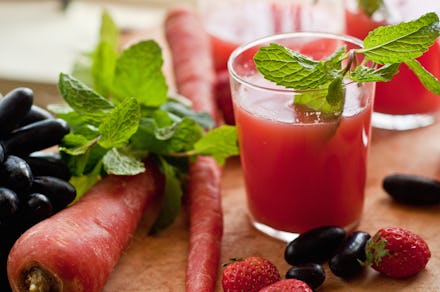Lay Off the Juice Cleanse Diet. You've Been Lied to.

A cup of fresh-squeezed fruits and veggies might seem like the ultimate healthy snack. With everyone from your next-door neighbor to A-list celebrities professing their love for $12 containers of the suspicious-looking stuff, there must be miracle in the bottle, right?
Wrong.
The juicing trend is just that: a trend. Despite their soaring popularity, liquefied fruits and veggies are far from the panacea they are claimed to be.
Here's why:
1. Your body doesn't need cleansing.
Our beautiful bodies come with a natural detox system. Our kidneys filter blood and remove wastes we ingest throughout the course of the day. These organs are super efficient. Even if we lost 90% of our kidney function, we could function normally with few or no symptoms. When paired up with the liver, which not only filters blood coming from our digestive tract but also detoxifies chemicals and processes drugs, our bodies are natural cleansing powerhouses.
"Unless there's a blockage in one of these organs that do it day and night, there's absolutely no need to help the body get rid of toxins," Ranit Mishori of the Georgetown University School of Medicine, who has spent years reviewing the medical literature on cleanses, told NPR. Thank your body by giving it the nutrients it needs, not depriving yourself of beneficial foods.
2. Juiced fruits and veggies are packed with sugar.
The American Heart Association says adult women should eat no more than 25 grams of added sugar per day. At 42 grams, a bottle of Suja's "Green Supreme" cold-pressed juice would put any drinker in the red. A can of Coca-Cola, even, is a better alternative at 39 grams.
Recently, nutritionists and public health experts have removed juices from their list of healthy foods. Instead of a glass of orange juice, most kinds of which are packed with corn syrup, experts say you should just go for an orange, which has much less sugar while containing fiber and other nutrients to make you feel full so you don't keep sipping.
3. The alleged "super juices" are ridiculously expensive.
Talk about a First World problem. Only upper-income people would splurge on a 5-pound cornucopia of fresh produce to reduce it to a few ounces of suspiciously colored, non-satiating liquid. On average, a serving of fresh fruits or veggies costs 9 times more per calorie than a helping of junk food.
If you don't juice at home, a bottle of recently pressed juice could fetch up to $12 a pop. That's 6 cents per calorie, as Anna Bahr over at the New York Times points out. At this rate, the average person would spend over $130 just to fulfill her daily caloric intake.
4. Juice "cleanses" are models for unhealthy, disordered eating.
Marketed as a quick fix to a boozy, fast-food-filled weekend, a few days of nothing but liquid promises to help keep the pounds off. But these fast-paced "solutions" are far from problem solvers. Instead, they encourage us to binge, then deprive ourselves of food. It's an even more dangerous scenario for people who are prone to developing eating disorders. For some, juice cleanses are the gateway drug to bigger problems, such as anorexia and bulimia.
Pauline Powers, leader of the Global Foundation for Eating Disorders' scientific advisory committee, calls juice cleanses "the perfect pathway to disordered eating." Doctors at eating-disorder treatment facilities agree. At one clinic in New York City, more than half of patients report having tried a juice cleanse. "Maybe a patient tried it and became obsessed, or maybe the eating disorder was already there and the juicing became part of it," the center's Director of Nutrition Services Debbie Westerling told Marie Claire.
5. Cleanses can actually cause you to lose muscle, not fat.
Most cleanses restrict you to fewer than 1,000 calories per day, about half of the amount a typical person needs to function normally. Without its usual supply of energy (carbohydrates) and protein, your body starts to break down its reserves of muscle to keep everything running smoothly. Bye-bye, summer six-pack.
6. Cold-pressed juices (the most-hyped kind) won't fill you up.
One of the reasons fresh fruits and veggies are so good for you is that they're chock-full of fiber, the filling nutrient buried inside apple skins and broccoli stalks. Unfortunately, cold-pressed juices are made by crushing fresh fruits and veggies, then pressing them with enough force to isolate all the juice. What you aren't drinking, then, is the fibrous pulp that helps your body digest food properly, fight cholesterol and keep you feeling full. Get ready for an extreme case of the hangries.
7. Adding juice to your diet is entirely unnecessary.
If you eat two pieces of fruit and three veggies every day, you've already reached your fruit and veggie quotient. That's a handful of berries with your breakfast cereal, salad with lunch and a grilled veggies in your spaghetti dinner. Easy as pie.
And unlike juice, plain old produce is far better for you when it comes to preventing diabetes and heart disease, filling you up so you don't overeat, and helping aid digestion. So step away from that $12 "miracle" juice and grab an apple instead.